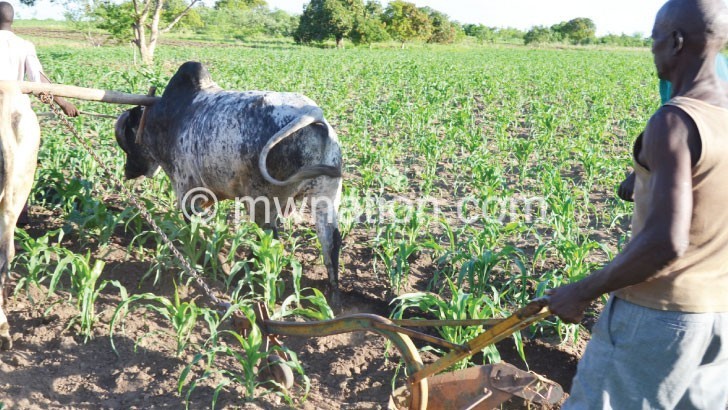Hoes, ploughs and tractors
Rice growers in Karonga illustrate how smallholder farmers in Malawi can use simple machines to simplify their back-breaking work.
Owning an ox-drawn plough has made it easy for Livingstone Mwangwela, 32, to till his three-acre rice field. In 2017, He bought the plough and two bulls at K450 000 to cut costs of hiring his neighbours’.
“It is never easy to grow rice using a hoe. Nearly everyone here uses a plough,” he says.
Mwangwera is one of hundreds rice growers in the paddies of traditional Authority (T/A) Kilupula in Karonga. He hires out his plough at K10 000 to K30 000 depending on the size of the plot.
“Some prefer ploughing my plot at no cost to take the plough to their fields, meaning I save time for other income generating activities while they prepare my field for planting,” he says.

Most farmers in Karonga own ploughs because they have livestock, says agriculturalist Dr Grivin Chipula.
Karonga dispels a popular belief that mechanisation is just about tractors. But very few people nationwide have livestock to use on their farms. This defeats farm mechanisation,” says the expert from Lilongwe University of Agriculture and Natural Resources (Luanar).
He finds it unfortunate that many people narrow down mechanisation to tractors which are not favourable due to the small land holding size.
“To use a tractor, there is need for farmers to consolidate their land,” he says.
With a growing population, customary land has become more fragmented and it is estimated that an average household owns a crop field the size of a football field. The tricky terrain makes the fields inaccessible to tractors.
“There are handheld tractors which can be handy for small-scale farmers, but these farmers cannot afford the small tractors. Government needs to remove or reduce duty on importation of these tractors,” he says.
Chipula wants mechanisation to cover the entire agriculture value chain, from tilling to harvesting.
“We have small technologies, yet farmers are not aware of these. That’s why to this day, farmers are still shelling maize and groundnuts using their hands,” he says.
The expert wants the government to create a Department of Farm Mechanisation in the Ministry of Agriculture to promote the use of both existing and emerging technologies.
“Only irrigation technologies are widely known because irrigation has a standalone department. Mechanisation is buried in the Crops Department, meaning that we are not taking this issue seriously. We needed to isolate it,” he says.
Agriculture expert Tamani Nkhono Mvula says the strides towards farm mechanisation are slowed by high cost of procuring and running the machines.
“All technologies being proposed by government have a cost that smallholder farmers cannot manage. It is beyond their means, so they are not the ones benefiting,” he says.
Mvula argues that although tractors are more efficient than hoes, the handheld tool, which has survived from colonial times, tends to be more efficient in the local setting where arable land is fragmented and small.
The agriculture activist urges farmers to form cooperatives that can access a tractor affordably.
He reckons the State-sponsored initiative to provide affordable tractors for all has not benefited the smallholder farmers because one needs to have at least five hectares to hire a tractor.
“Presently, farm mechanisation is much slower than what we would have loved. The tractorisation programme is more suited for commercial farmers who are in minority. They could have prioritised the handheld tractors for the benefit of the majority who farm an acre or so” he says.
Mvula asked for reforms in the tractor programme, which has been marred by the sale of tractors bought using a loan from India at a loss.
But Ministry of Agriculture, Irrigation and Water Development spokesperson Hamilton Chimala says government is already uniting farmers into cooperatives in the World Bank-funded Agricultural Commercialisation Project.
But for farmers like Mwangwela, who do not belong to any cooperative or club, ox-drawn machines are proving handy in weaning them from hoes as they vie to do more farm work, faster and better.





